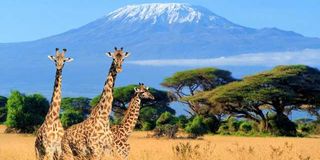Tanzania using geographical location to unlock its full economic potential

Giraffes graze near Mount Kilimanjaro’s base. Photo | file
What you need to know:
- Policymakers should understand that geography plays a critical role in shaping the country's economic, social, and environmental systems
Today let me beat some drums for Geography. It is indeed life. Tanzania's economic projected growth rate of 5.6 percent for 2023 is set to be the third fastest-growing economy in Africa. One of the open secrets is that it has much to do with geography.
One of the critical drivers of Tanzania's economic growth has been the country's focus on developing its infrastructure. This has included investments in roads, railways, and ports, which have improved the country's connectivity and made it easier for various businesses to operate.
In addition to infrastructure development, Tanzania has also implemented policies that are friendly to businesses such as agriculture, tourism, minerals, oil, gas, merchandising, transport, among others.
Another factor contributing to Tanzania's economic growth is its strategic geographical location. As a country, we are the heartbeat of East Africa. The ideal geographical location and the associated infrastructure make the country access the East African and Southern African markets.
From a geographical perspective, all roads, railways, and ports, their developments are designed around geographical features such as rivers, mountains, and coastlines.
Talk of our natural resources, the location of cities, towns, and other human settlements, and environmental issues at the end of the day, they are influenced by geography.
Geographical factors shape human migration patterns. We live in a particular place because of economic opportunities; it has a lot to do with geography. Look at Mt Kilimanjaro and other diverse tourist attractions in our dear motherland; most are about geographical features.
Even though someone is farming maize instead of coffee, it has a lot to do with geographical factors. Yes, agriculture and food production systems are affected by various geographical factors, including climate, soil quality, and access to water resources. Talk about renewable energy sources, such as solar and wind power, depend on geographical factors such as the availability of sunlight and wind.
Every Tanzanian should take geography seriously and recognize its importance in shaping the country's economic, social, and environmental systems.
Geography is a critical discipline, that can help Tanzanians better understand their country and world. Unfortunately, some parents discourage their children from studying geography at the university simply because they do not see direct career paths in civil service or business that begin with the title "geographer", unlike fields such as medicine or engineering where the titles of a "Dr." or an "Engineer" make career paths clear-cut.
However, this narrow-minded view overlooks the versatility and value of geography as a discipline—the feature of geography as a study is guaranteed. Today, civil, environmental, and transportation engineering can only do with geographic information systems (GIS), and remote sensing.
Tanzanians tasked with managing our natural resources need to know geography and use it as a valuable tool for management. Geographical knowledge is essential for ensuring national resources' long-term sustainability and promoting economic growth and social well-being in Tanzania.
Without geographical knowledge, how can we manage watersheds and river systems? What of land systems for managing the country's agricultural resources? What geographical knowledge of Tanzania's natural resources for managing our energy resources- natural gas, coal, and hydropower?
Without any doubt, stable economic growth and sustainable development in Tanzania, as an expansive knowledge of geography is a key factor that should be considered important at all levels.
Policymakers should understand that geography plays a critical role in shaping the country's economic, social, and environmental systems, a deep understanding of these systems is essential for promoting long-term sustainable development of the country and its people.





